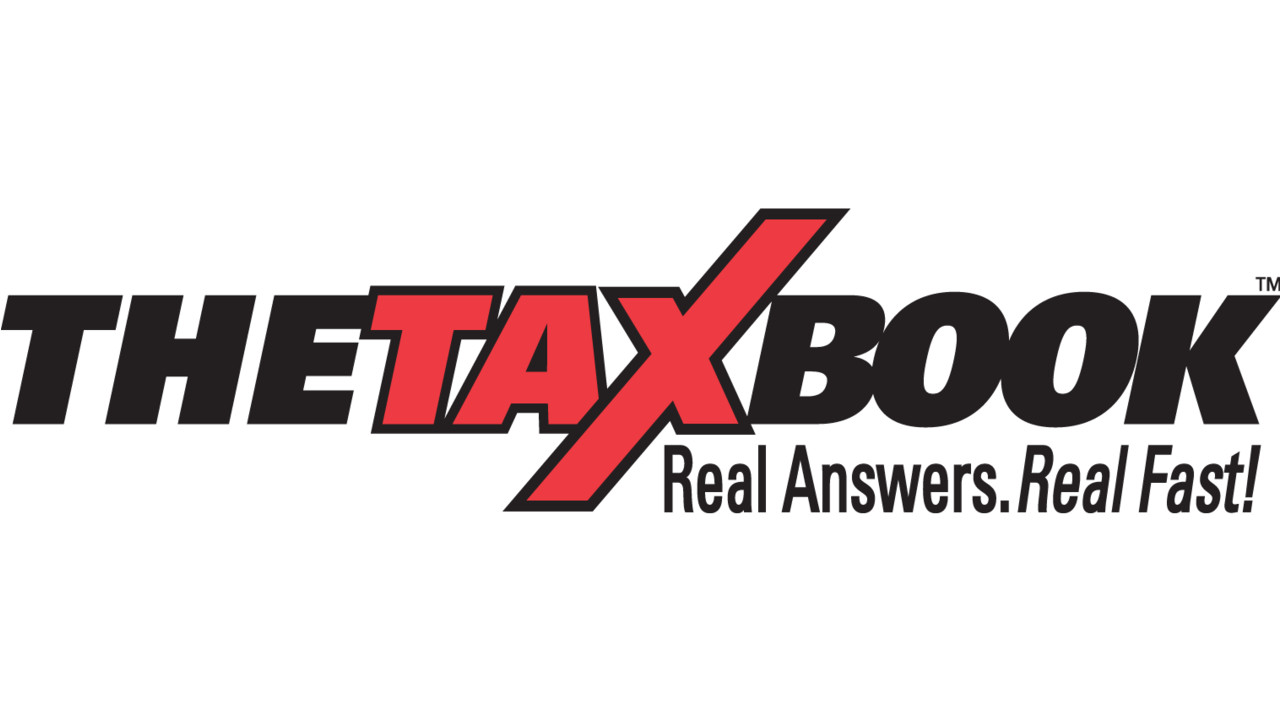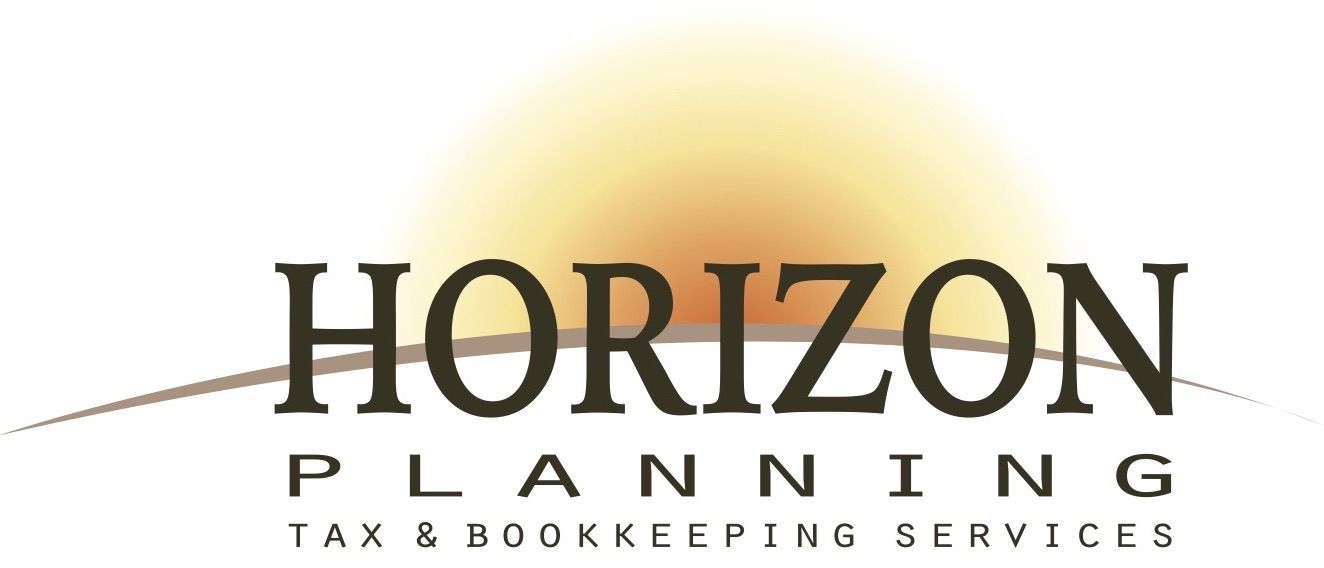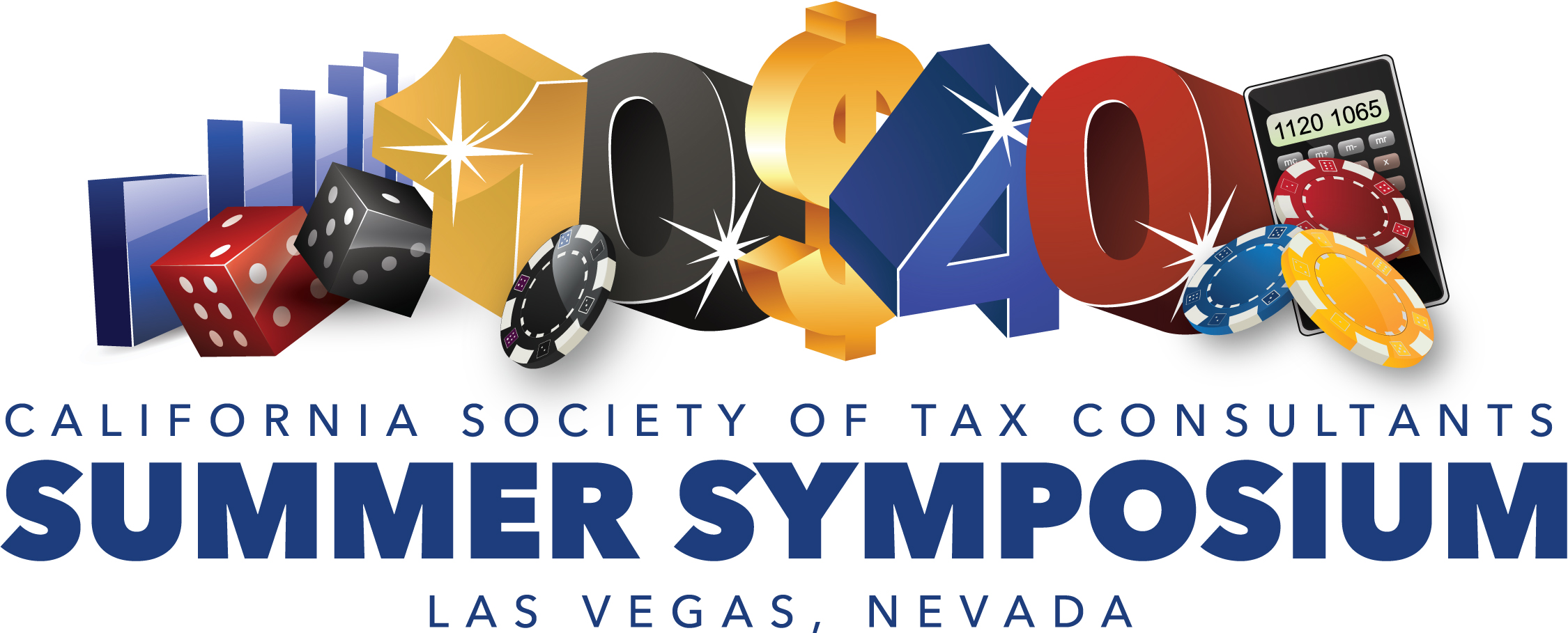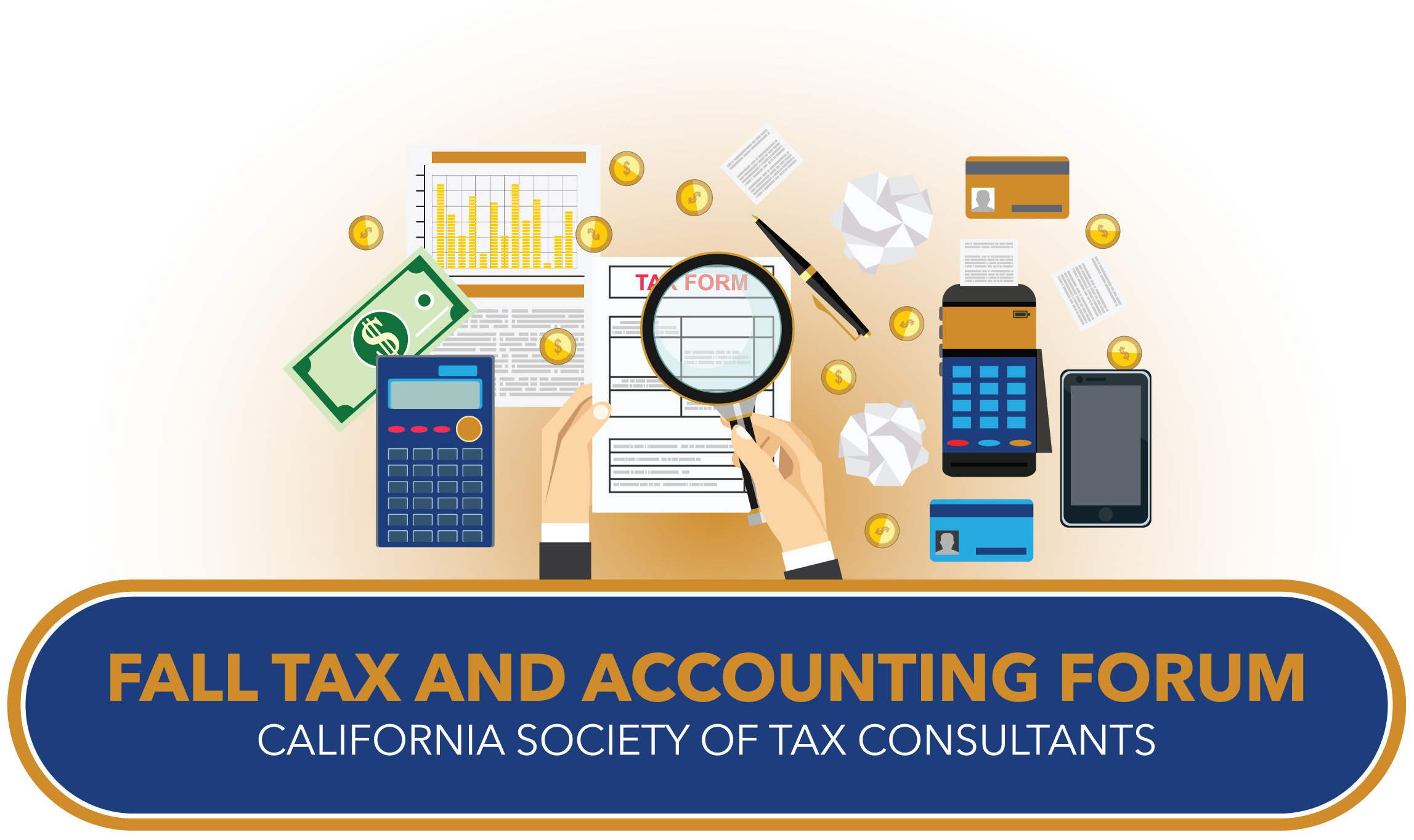|
In This Issue...
- From the President
- Register for the 2019 Summer Symposium
- May 2019 Chapter Events
- May 2019 Board Meeting
- Welcome New CSTC Members
- Call for Presenters for the 2019 Fall Forum!
- News from the IRS
- Join CSTC
CSTC Member Benefits

CSTC members have access to benefits such as free payroll processing services for your tax practice, and the opportunity to earn new revenue through their flexible partnership options.

CSTC is pleased to include the VeriFyle ProTM premium secure online document and message sharing service at no cost to CSTC members!

Wolters Kluwer: Discounts on Tax, Accounting & Audit Resources, Software, Information & Services.

CSTC members receive the TaxBook WebLibrary at a special price
Other Member Benefits Include:
$ Savings on all Society Educational Events
$ Savings on Contact, Correspondence & Self Study Education
$ Savings with member specialty CSTC Connects (previouslyYellow Pages) list
$ Savings with E & O Insurance, plus specialty coverage relevant to your profession
$ Online CSTC Find-a-Tax Consultant search to help promote your business!
$ CSTC Member Listserv

Office Depot has partnered with us to provide exclusive savings in-store and online, plus fantastic additional benefits. This program is all about providing preferred pricing to our clubs, and the savings extend to almost every item.
Savings include 20% to 55% off item office supply core list, 20% to 55% off retail on cleaning & break room items, 10% off branded; 20% off private brand ink & toner core list, Average 10% off retail on 200 technology core items, Free next-day shipping on orders of $50 or more, and SIGNIFICANT savings on copy & print. Become a CSTC member to sign up for our Office Depot Small Business Savings Program, administered by Excelerate America.

We are a professional full-service tax advisory firm in San Diego. Our goal is to provide a level of service for our clients that will exceed expectations in every possible way. We strive to offer a diverse level of services in order to meet the needs of the diverse community we have been working in for more than 30 years.

TaxMama's® EA Exam Course prepares tax professionals to do so much more than just pass the IRS' Special Enrollment Examination. This is in-depth course teaches tax law from the ground up. It explains how tax returns work, with examples of basic 1040s, Schedule Cs, 1065s, 1120s, and 1120Ss; you learn tax law, tax research, client representation for audits, appeals and collections.

If you are interested in buying or selling a practice, contact us today! ATB is operated by Enrolled Agents ensuring a complete understanding of our profession. Please give us a call at (855) 428-2225 or visit us online at www.ATBCAL.com for more information and to view our current listings.
CA DRE 02002824
CSTC Mission
CSTC advances professionalism within the tax industry by:
- Providing quality education
- Creating networking opportunities
- Advocating professional standards
|
From the President
August 24, 2012, is a day I will never forget. I woke up at 4 A.M. in the Whitney Portal campground after a few hours of sleep and set out with six friends to hike to the summit of Mount Whitney, the highest peak in the continental United States. After hiking a few hours in the dark, the sun  came out and painted a gorgeous scene of jagged granite mountains with contrasting green pine trees. Once you hike above 10,000 ft elevation there are no more trees, just beautiful bare rock, stubby greenery, and wild blue lakes. Beyond the 13,000 foot mark there is no plant life at all, just bare rock, some snow, and open sky. came out and painted a gorgeous scene of jagged granite mountains with contrasting green pine trees. Once you hike above 10,000 ft elevation there are no more trees, just beautiful bare rock, stubby greenery, and wild blue lakes. Beyond the 13,000 foot mark there is no plant life at all, just bare rock, some snow, and open sky.
Preparation for the hike included a lot of trail running, hiking, and exercise. To stay motivated, I held onto the belief that if I worked hard to prepare, the experience would be more enjoyable (or less difficult). For the most part, the hike went incredibly well. It was very difficult and I had to get used to my heart pounding in my ears, but the weather was perfect and the views were spectacular.
The hike is not too bad until you get to the famous Mt. Whitney Switchbacks that seem to go on forever. Once you are about half-way up  them, you realize just how high you have hiked and how much further you have to go. The ugly thing about switch-backs is that you can see them for miles and they never seem to end. They are monotonous and you have to keep pushing on to the end. Stopping in the middle is not an option. them, you realize just how high you have hiked and how much further you have to go. The ugly thing about switch-backs is that you can see them for miles and they never seem to end. They are monotonous and you have to keep pushing on to the end. Stopping in the middle is not an option.
Finally, you summit 14,505 feet and truly feel like you are on the top of the world. Colors up that high are different than at home. The sky is a unique deep blue and the lakes below are a glacier blue. All the work pays off with the realization that you have done something special and can see things that most people have not seen.
 WHAT DOES THIS HAVE TO DO WITH TAXES? WHAT DOES THIS HAVE TO DO WITH TAXES?
I imagine that some of you are reading this and thinking, “Hey, that it sounds like my tax season”. Every January you dive deep into tax season to face new challenges and meet new clients, but not before you have thoroughly prepared. With so many law changes, update classes and specialty classes are a big part your life October through December. You attend those classes because knowing as much as possible before January will help you get through the season. You know that being prepared is the key to staying sane and being able to help clients. Like my Mt. Whitney hike, you start the season early and keep pushing all the way through to April 15. Mid-season, you can’t just sit down and give up, you have to push on and you do. Those mid-season switch-backs are brutal because you can see how much further you need to go and it does not look any easier ahead, but you push on and get through. Once April 15 arrives and you put that last return in the mail or press send for the last time, you’ve done it! You’ve completed another tax season! You’ve made it to your summit for 2019.
 After April 15th, are you finished for the year? No! Once at the top of Mt. Whitney was I finished? No! I had to get back down the trail. Getting down is easier in many ways, but is still a lot of work. After tax season work is typically not as much pressure from the big deadline, but still there is a lot of work to do. After April 15th, are you finished for the year? No! Once at the top of Mt. Whitney was I finished? No! I had to get back down the trail. Getting down is easier in many ways, but is still a lot of work. After tax season work is typically not as much pressure from the big deadline, but still there is a lot of work to do.
Now that April 15th has come and gone, take a little time to pat yourself on the back. You helped many clients, consoled those who owe taxes, celebrated with those who got refunds, answered more tax questions than ever before, counseled more than ever on how to approach the next tax year, realized once again that you can do hard things, coffee became your best friend, you thought more about retirement than ever before, you questioned the wisdom of staying in the tax business, and most importantly you saw the great benefit of preparation before the season started.
Congratulations! You did it again!
Gary Quackenbush,
CSTC President
2019 Summer Symposium
June 9-12 2019
Westgate Las Vegas Resort & Casino

Registration is Open for the 2019 Summer Symposium!
Schedule-at-a-Glance
| |
Sunday, June 9, 2019
|
| 3pm |
Registration Opens; Exhibitor Set-up |
| 5:20pm-6pm |
Welcome Reception for First Time Attendees |
| 6pm-9pm |
Welcome Dinner
This event is family friendly.
(Included with full registration. Guest registration is $40) |
| |
Monday, June 10, 2019
|
| 6:30am-5pm |
Registration and Exhibits |
| 7:30am-9:00am |
Session 1: IRS Keynote Presentation and Breakfast
Scott Irick Deputy Director, Examination, Small Business/Self-Employed
|
| 9:15am-10:05am |
Breakout Sessions (all sessions will continue after the break): |
| |
Session 2: 199A - Qualified Business Income Deduction
Claudia Stanley, CPA, EA
|
| |
Session 3: 1031 Exchanges and Their New Counterpart - Opportunity Zones
Ruth Godfrey, EA |
| |
Session 4: Reporting K-1's for Tax
Jane Ryder, EA, CPA |
| |
Session 5: Toilets, Tenants & Trash: Capital Gains Tax Reduction Strategies
Frank Acuña, Attorney at Law |
| 10:05am-10:20am |
Break with Exhibitors |
| 10:20am-12:00pm |
Breakout Sessions (continued from before the break): |
| |
Session 2 Continued: 199A - Qualified Business Income Deduction
Claudia Stanley, CPA, EA
|
| |
Session 3 Continued: 1031 Exchanges and Their New Counterpart - Opportunity Zones
Ruth Godfrey, EA |
| |
Session 4 Continued: Reporting K-1's for Tax
Jane Ryder, EA, CPA |
| |
Session 5 Continued: Toilets, Tenants & Trash: Capital Gains Tax Reduction Strategies
Frank Acuña, Attorney at Law |
| 12:00pm-1:20pm |
Lunch on own |
| 1:20pm-3:00pm |
Breakout Sessions: |
| |
Session 6: California Old School Differences
Eugene Ostermiller, EA, NTPI Fellow |
| |
Session 7: Advanced Schedule C Audits
LG Brooks, EA, CTRS |
| |
Session 8: The Sharing Economy
Karen Joyner, EA |
| |
Session 9: How to Serve Immigrant Mixed-Status Families
Antonio Martinez, EA |
| 3:00pm-3:20pm |
Break with Exhibitors |
| 3:20pm-5:00pm |
Session 10: Cryptocurrency, the IRS, and You
John Miller, EA |
| |
Session 11: Marijuana Taxation in California
William Rogers, MBA, CFP, EA |
| |
Session 12: Dependency in Depth
Shannon Hall, EA |
| |
Session 13: Tax Issues for US Citizens Abroad
Monica Haven, EA, JD, LLM
|
| 5:00pm-6:00pm |
Reception with Exhibitors |
| 6:00pm |
Evening on Own |
| |
Tuesday, June 11, 2019
|
| 6:30am-5pm |
Registration and Exhibits |
| 7:30am-9:00am |
Session 14: California Keynote Presentation and Breakfast
Susan Maples, CPA, California Tax Payer Rights Advocate
|
| 9:00am-9:15am |
Break |
| 9:15am-10:05am |
Breakout Sessions (all sessions will continue after the break): |
| |
Session 15: Appealing Decisions - Audit, OIC, Tax Court, Bankruptcy Court, Federal District Court
Gary Quackenbush, Esq |
| |
Session 16: Everything S-Corp!
Jane Ryder, EA, CPA |
| |
Session 17: Baby, Oh Baby!
Karen Joyner, EA |
| |
Session 18: Engagement Letters
LG Brooks, EA, CTRS |
| 10:05am-10:20am |
Break with Exhibitors |
| 10:20am-12:00pm |
Breakout Sessions (continued from before the break): |
| |
Session 15 Continued: Appealing Decisions - Audit, OIC, Tax Court, Bankruptcy Court, Federal District Court
Gary Quackenbush, Esq |
| |
Session 16 Continued: Everything S-Corp!
Jane Ryder, EA, CPA |
| |
Session 17 Continued: Baby, Oh Baby!
Karen Joyner, EA |
| |
Session 18 Continued: Engagement Letters
LG Brooks, EA, CTRS |
| 12:00pm-1:20 pm |
Lunch on own |
| 1:20pm-3:00 pm |
Breakout Sessions: |
| |
Session 19: Passive Activity Loss Limitations
Eugene Ostermiller, EA, NTPI Fellow |
| |
Session 20: What's my Character?
Claudia Stanley, CPA, EA
|
| |
Session 21: Domestic Tax Issues for Non-Resident Aliens
Monica Haven, EA, JD, LLM
|
| |
Session 22: The Art and Science of Divorce Taxation in 2019
Armand D'Alo, EA, CFP, CDFA and Robbin D'Alo, EA, CLA, CDFA |
| 3:00pm-3:20pm |
Break with Exhibitors |
| 3:20pm-5:00pm |
Session 23: California: Do You see What I CA?
Shannon Hall, EA |
| |
Session 24: Correcting Depreciation - Form 3115 Line-by-Line
Karen Joyner, EA |
| |
Session 25: Residents/Non-Residents
Antonio Martinez, EA |
| |
Session 26: Choice Of Entity. LLC, INC, LP, GP, SP - How To Choose?
Gary Quackenbush, Esq |
| 5:30pm-6:30pm |
**BONUS IRS SESSION ADDED!**
Navigating the IRS and Managing the Aftermath of a Data Breach
Marc Zine, Senior Stakeholder Liaison and Katie Williams, Senior Stakeholder Liaison
|
| |
Wednesday, June 12, 2019
|
| 6:30am-5pm |
Registration and Exhibits |
| 7:30am-9:00am |
Session 27: Best Practices - Compliance and Documentation Presentation and Breakfast
Monica Haven, EA, JD, LLM
Class to continue after the break |
| 9:00am-9:15am |
Break |
| 9:15am-10:05am |
Session 27 Continued: Best Practices - Compliance and Documentation Presentation and Breakfast
Monica Haven, EA, JD, LLM
|
| 10:05am-10:20am |
Break with Exhibitors |
| 10:20am-12:00pm |
Breakout Sessions: |
| |
Session 28: Compensatory Stock & LLC Benefits (Options RSU's, ESPP, Etc)
Jane Ryder, EA, CPA |
| |
Session 29: Fresh Starts - Installment Agreement, OIC, Tax Lien Relief, Bankruptcy, Innocent Spouse, Injured Spouse
Gary Quackenbush, Esq |
| |
Session 30: How to Read a Trust
Frank Acuña, Attorney at Law |
| |
Session 31: Tax Penalties & Abatement
LG Brooks, EA, CTRS |
| 12:00pm-1:20pm |
Lunch on Own |
| 1:20pm-3:00pm |
Session 32: Stump the Tax Experts
|
| 3:00pm-3:20pm |
Break |
| 3:20pm-5:00pm |
Session 33: Ethics - What Would You Do?
Claudia Stanley, CPA, EA
|
| 5:15pm |
Grand Prize Drawing |
Registration Fees
| Category |
After May 1, 2019 |
| Members |
$575 |
| Staff of Members |
$600 |
| Non-Members |
$675 |
| Sunday Social Event Guest Tickets |
$40 |
Click here to visit the 2019 Summer Symposium page to learn about our topics, speakers, and more!





May 2019 Chapter Events
May 1, 2019
Topic: Ethics - The Professional Legal Issues
Temecula Valley Chapter Meeting
2 Ethic Hours
May 2, 2019
Topic: A New Ingredient For a Successful 2018 Tax Return - Section 199A
San Gabriel Valley Chapter Meeting
2 Federal Law Hours
May 7, 2019
Topic: Pitfalls and Success Stories - A Moderated Round Table
East County San Diego Chapter Meeting
1 Federal Law Hour
1 California Hour
May 8, 2019
Topic: Ethics - Due Diligence
Orange County Chapter Meeting
2 Ethic Hours
Topic: Debriefing - Is It Really Over?
San Francisco Bay Chapter Meeting
2 Federal Law Hours
May 9, 2019
Topic: Pesky Problems
North County San Diego Chapter Meeting
1 Federal Law Hour
1 California Hour
May 15, 2019
Topic: After Tax Season Breakfast Meeting
Temecula Valley Chapter Meeting
Hours TBA
Topic: EDD: Cannabis Industry & State Payroll Taxes And Round Table Discussion
San Jose Chapter Meeting
2 California Hours
1 Federal Update Hour
May 16, 2019
Topic: Ethics
San Diego Chapter Meeting
2 Ethic Hours
May 28, 2019
Topic: Marijuana Taxation in California
Orange County - South Chapter Meeting
1 Federal Law Hour
1 California Hour
Click here to view the CSTC calendar.
May 2019 Two Day Board of Directors Meeting
Monday, May 6, 2019 – 10:00 am – 4:00 pm
Tuesday, May 7, 2019 – 10:00 am – 2:30 pm
Location: Holiday Inn Express & Suites Santa Ana - Orange County
1600 E First St
Santa Ana, CA 92701
(714) 834-9455
Welcome New CSTC Members!
Please help us in joining our newest CSTC Members!
Kathern Brown
San Francisco Bay Chapter
Casper Chiang
San Jose Chapter
Fernando Evangelista
Orange County Chapter
Elizabeth Ferreira
San Jose Chapter
Iva Franklin
Temecula Valley Chapter
Ronald Graichen
Orange County Chapter
Hong Uyen Le
San Jose Chapter
Harris Levin
Sacramento Chapter
Lawrence Sam
Greater Long Beach Chapter
Don Stabler
Los Angeles Chapter
Mohana Suggula
San Jose Chapter
Tammy Terra
San Diego Chapter
Karen Totanes
North County San Diego Chapter
Stephanie Vargas
North County San Diego Chapter
Juan Velasquez
Sacramento Chapter

Call for Presenters for the 2019 Fall Tax and Accounting Forum in Sacramento!
The California Society of Tax Consultants (CSTC) provides quality tax education for tax professionals, including CTEC-registered preparers, Enrolled Agents, CPAs and attorneys. CSTC's 2019 Fall Forum will be held September 20-21, 2019 at the Courtyard by Marriott Sacramento Cal Expo in Sacramento, CA. It will focus on tax and accounting for non-profit organizations.
We are seeking presenters for this interactive, hands-on event. Our goal is to provide in-depth coverage of the accounting and tax issues faced by non-profits using case studies to illustrate the concepts. Sessions are two-or four-hour classes that provide the attendees with both knowledge and hands-on application. Presenters will work together to craft case studies for use throughout the two-day event.
We are accepting submissions in all areas relating to non-profits including:
Accounting for Non-Profits:
- Accounting issues for non-profit organizations
- Preparing financial statements for non-profits
Tax for Non-Profits:
- Tax issues for non-profits
- Preparing Form 990
- Unrelated business taxable income (UBTI)
- How TCJA affects non-profits
Please fill out the Call for Presenters Form in its entirety and submit it no later than May 6, 2019 at 5:00 PM. Only complete submissions will be considered.
Click here to access the Call for Presenters form
Presenters are selected by the Education Committee based on recommendations and fit with the overall goal of the Fall Forum. All submitters will be notified by the end of May.
If you have any questions, please contact Linda Dong by phone at 626-288-8558 or by email at [email protected]. You can also contact the Society Office at 949-715-4192 or [email protected].
Schedule coming soon!

IR-2019-72, April 12, 2019
WASHINGTON — With the April tax-filing deadline just days away, the Internal Revenue Service reminds the 50 million taxpayers who have yet to file their tax returns that there are a variety of options to help them in the final days of tax-filing season.
About 153 million individual tax returns for the 2018 tax year are expected to be filed during 2019, with millions expected just before the April tax deadline. The deadline to file 2018 individual tax returns and pay taxes owed is Monday, April 15, 2019, for most taxpayers. Because of local holidays, the deadline for taxpayers living in Maine or Massachusetts is April 17, 2019.
IRS tax help is available anytime on IRS.gov. Whether filing a tax return, requesting an extension or making a payment, the IRS website can help last-minute filers on just about everything related to filing taxes.
Information about free e-file options, such as IRS Free File, how to request an automatic six-month filing extension or fast, secure ways to pay any tax due using IRS Direct Pay are available online at IRS.gov.
The busiest part of tax season begins this week, with millions of people planning to file. By April 5, the IRS had received more than 103 million tax returns and issued almost 78 million tax refunds totaling $220.8 billion. The average refund to date is $2,833.
Additional filing season numbers:
- The IRS expects to receive about 14.8 million individual income tax returns for the week ending April 12, and most are expected to be filed electronically.
- On top of those 14.8 million tax returns, the IRS expects to receive another 18.3 million tax returns the following week.
- Overall, this year, the IRS expects to receive about 14.6 million extension requests from taxpayers, many of them in the final days of filing season. The vast majority of the Forms 4868, Application for Automatic Extension of Time to File U.S. Individual Income Tax Return, being filed electronically.
Tax preparation help
Individual taxpayers have several options for filing their tax returns electronically and many are free:
- IRS Free File and Fillable Forms: Taxpayers with income of $66,000 or less will find one or more free tax preparation software options available only through Free File on IRS.gov. All taxpayers including those with incomes above $66,000 and comfortable doing their own taxes can use Free File Fillable Forms.
- Free Tax Return Preparation Sites: The IRS Volunteer Income Tax Assistance (VITA) and the Tax Counseling for the Elderly (TCE) programs offer free tax help and e-file for taxpayers who qualify. Many VITA and TCE sites operate by appointment so call soon, appointment-only sites tend to fill up fast late in the tax-filing season. You can find your nearest VITA or TCE site here.
- Commercial Software: A variety of tax preparation software to prepare and file taxes is available for purchase online and through retail outlets.
- Authorized E-File Providers: An e-file provider is an IRS approved tax professional that is qualified to prepare, process, and transmit electronic tax returns.
In addition, IRS.gov has tax forms and instructions to download, print, sign and mail. Taxpayers can also use the Interactive Tax Assistant tool to answer many tax questions they may encounter.
Get an extension
The IRS offers extra time to file, automatically, to all taxpayers requesting it. A filing extension allows taxpayers until Oct. 15 to gather, prepare and file their taxes with the IRS. However, it does not extend the time to pay any tax due.
Applying for an extension of time to file is easy – and free. Individual tax filers can e-file their extension form for free using Free File. They can also get an extension by paying an estimate of their income tax due and indicate that the payment is for an extension using Direct Pay, the Electronic Federal Tax Payment System (EFTPS), or a credit or debit card. This way taxpayers won’t have to file a separate extension form and they will receive a confirmation number for their records.
Taxpayers can also request an extension through a paid tax preparer, tax-preparation software or by mailing a paper Form 4868. If mailing a Form 4868, the form must be mailed to the IRS with a postmark on or before the April tax-filing deadline.
Make a payment
When paying taxes this year keep in mind:
- Electronic payment options are the quickest and easiest way to make a tax payment.
- IRS Direct Pay is a free, easy way to pay online directly from a checking or savings account.
- Taxpayers can choose to pay with a credit or debit card although the payment processor will charge a processing fee. No fees go to the IRS.
- The IRS2Go app provides the mobile-friendly payment options, Direct Pay and Card payments on mobile devices.
- Taxpayers can pay using their tax software when they e-file. If using a tax preparer, ask the preparer to make the tax payment electronically.
- Taxpayers may also enroll in the Electronic Federal Tax Payment System and have a choice of using the internet or phone by using the EFTPS Voice Response System.
- Taxpayers can go to IRS.gov/account to securely access information about their federal tax account. They can view the amount they owe, access their tax records online, review their payment history and view key tax return information for the most recent tax return as originally filed.
Join the California Society of Tax Consultants!
Click here to fill out an online application.
CSTC advances professionalism within the tax industry by:
- Providing quality education
- Creating networking opportunities
- Advocating professional standards
|